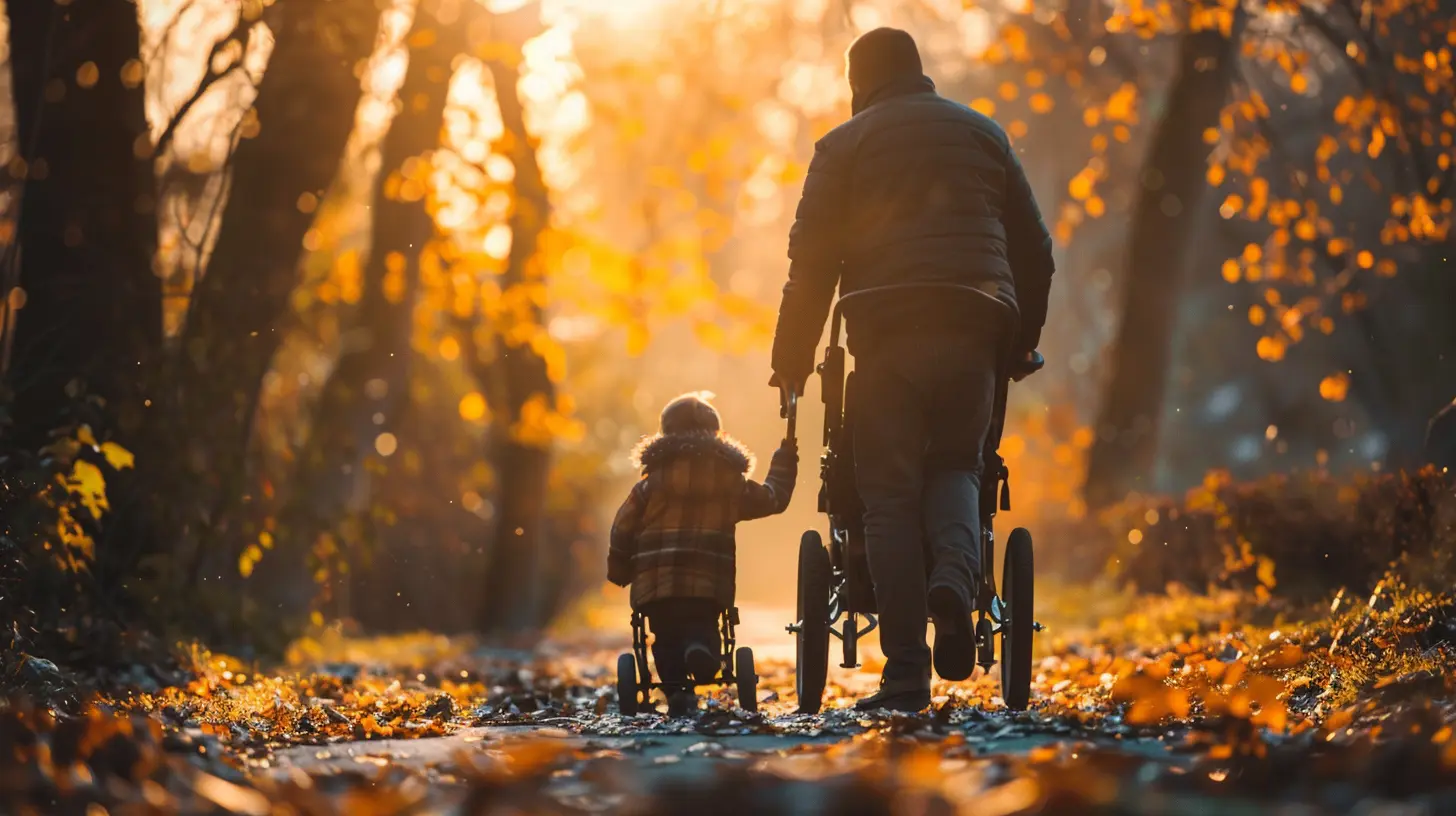Nurturing Emotional Independence in Children with Special Needs
1 March 2025
Parenting is always challenging, but when your child has special needs, those challenges can feel even more daunting. One of the most crucial aspects of raising any child is helping them grow emotionally independent — and this is just as important, if not more so, for children with special needs. But how do you nurture emotional independence in a child who needs extra support? Can children with special needs really develop these critical skills? The good news is: Absolutely! With the right approach, guidance, and patience, it’s not only possible but incredibly rewarding. Let’s dive into how you can foster emotional independence in your child with special needs and why it's so essential.

What is Emotional Independence?
Before we jump into the how, let’s first clarify the what. Emotional independence refers to the ability to understand, manage, and express one's emotions, while also developing the ability to cope with everyday challenges effectively. Imagine it like this: growing emotional independence is similar to teaching your child how to ride a bike. At first, they might need training wheels, and you’ll be right there holding on to the seat. But eventually, they’ll balance on their own and steer down the path with confidence. That's what we're aiming for when it comes to emotions.For children with special needs, emotional independence can sometimes take more time and require more nurturing — and that’s perfectly okay. The journey may look different, but the destination is the same.

Why is Emotional Independence Important for Children with Special Needs?
It’s no secret that children with special needs often face unique challenges, whether physical, cognitive, social, or a combination of these. While every child’s experience is different, helping them develop emotional independence can make it easier for them to:- Handle stress: Emotional independence equips children to manage stressful or overwhelming situations more effectively.
- Build social relationships: A child who understands their emotions is better able to communicate and connect with others.
- Boost their self-confidence: Children who feel more in control of their emotions often feel more confident in all areas of life.
- Adapt to new situations: Whether it’s starting school, joining a group activity, or making new friends, emotional independence allows children to handle changes more smoothly.
For children with special needs, fostering emotional resilience can improve their overall quality of life and empower them to become more self-reliant over time. It's not just about getting through the day-to-day; it's about setting the foundation for lifelong growth.

Understanding the Challenges Children with Special Needs Face
Before we get into practical steps, it’s crucial to acknowledge some of the challenges these children may face in their journey toward emotional independence:- Communication Barriers: Some children with special needs may have difficulty expressing their emotions due to speech delays or communication difficulties.
- Sensory Sensitivities: Kids with sensory processing issues may feel overwhelmed by certain environments or stimuli, making emotional regulation harder.
- Social Struggles: Social cues might not come naturally to children with autism or other developmental disorders, which can lead to frustration and emotional outbursts.
Understanding these hurdles enables parents to be more empathetic and patient as they help their child navigate emotional growth. Now, let’s explore how to address these challenges and support your child’s journey toward becoming emotionally independent.

7 Effective Strategies to Nurture Emotional Independence
1. Create a Safe and Predictable Environment
Imagine trying to learn a new skill in a chaotic, unpredictable environment. Sounds stressful, right? Children with special needs often crave routine and structure, as this sense of predictability helps them feel secure. When your child knows what to expect, they are more likely to stay emotionally regulated.- Tip: Establish daily routines that include consistent times for meals, bedtime, play, and other activities. Use visual schedules or charts if necessary.
A consistent environment gives children the emotional "safety net" to explore their feelings and reactions without fear of the unknown.
2. Teach Emotional Vocabulary
Many children with special needs struggle with identifying and naming their emotions. How can they be expected to manage their feelings if they don’t know how to describe them? That’s where emotional vocabulary comes into play.Introduce simple words like "happy," "sad," "angry," and "excited" first. Over time, you can add more complex words like "frustrated," "proud," or "nervous."
- Tip: Use books, songs, and even facial expression flashcards to help your child connect words to emotions. Encourage them to use these words when talking about how they feel.
Teaching your child to label their emotions helps them gain a better grip on understanding their emotional world.
3. Model Emotional Regulation
Children learn more from what you do than from what you say. So, if you’re quick to anger or have trouble managing stress, chances are your child might reflect that behavior. Modeling emotional regulation is essential.- Tip: Whether it’s taking deep breaths when frustrated or using calm words to express anger, make sure to demonstrate how to manage emotions in front of your kid.
You can even narrate what you're doing: "I’m feeling a little upset right now, so I’m going to take a deep breath to calm down." This way, they can observe and learn coping mechanisms firsthand.
4. Encourage Problem-Solving Skills
Instead of rushing in to fix every problem for your child, encourage them to find solutions on their own. Fostering problem-solving skills is a key component of emotional independence. Of course, it’s fine to offer guidance, but try to avoid doing everything for them.- Tip: When a problem arises, ask open-ended questions like, “What do you think we should do?” or “How can we fix this?”
Breaking problems into smaller, more manageable steps helps children build confidence — and reduces their reliance on you for every challenge.
5. Develop Coping Skills for Overwhelm
For many children with special needs, emotional overwhelm can come out of nowhere, leading to meltdowns or shutdowns. Teaching coping skills is like giving your child a toolbox filled with different tools they can use during these tough emotional moments.- Tip: Introduce sensory-friendly techniques like squeezing a stress ball, listening to calming music, or deep breathing.
You might also create a "calm-down corner" in your home — a cozy space where your child can retreat to whenever they feel emotionally overwhelmed.
6. Validate Their Emotions
It’s easy to brush off a child’s emotions as "dramatic" or "overreacting." But for children with special needs, their feelings are very real, and invalidating them can hinder emotional growth. Even if their reaction doesn’t seem to fit the situation, it’s important to acknowledge their emotions.- Tip: Say things like, “I see that you’re feeling frustrated right now. It’s okay to feel that way.”
By validating their emotions, you help them feel understood, which is essential in learning to process feelings healthily.
7. Provide Opportunities for Independence
The more opportunities your child has to practice making decisions and navigating emotions on their own, the more comfortable they’ll become in doing so. Start small, with tasks or choices appropriate for their developmental level.For example:
- Let them choose their outfit for the day or decide what snack they’d like.
- Encourage solo playtime or independent activities where they can explore emotions through creative play.
- Tip: Even in social settings, encourage your child to express their needs to others. This could be asking a peer to share a toy or telling a teacher they need a break.
Gradually increasing these opportunities will bolster your child’s emotional self-reliance.
Managing Setbacks and Celebrating Progress
Let’s be honest: Emotional independence isn’t something that happens overnight. There will be setbacks, and some days may feel like you’re moving backward instead of forward. But remember, every child’s pace is their own. Celebrate small victories, even if they seem minor — mastering a new emotional word, successfully calming down after a meltdown, or discussing their feelings without prompting. Every step is progress!Keep in mind that setbacks are a natural part of the growth process. What matters is that your child is learning, growing, and developing emotional tools that will benefit them throughout their life.
The Role of Professional Support
As you navigate this journey, don’t feel like you have to do it alone. Speech therapists, occupational therapists, and counselors specialized in working with children with special needs can offer guidance, strategies, and tools to support emotional independence. Lean on professionals when needed — they’re there to help both you and your child.Conclusion: The Importance of Patience and Persistence
Nurturing emotional independence in your child with special needs is a long-term commitment, and it won’t always be easy. But with patience, persistence, and the right strategies, you’ll empower your child to better understand and manage their emotions. Over time, this will lead to improved social relationships, a stronger sense of self, and, most importantly, a happier and more fulfilled child.You’re not just helping them survive the daily challenges — you’re equipping them with lifelong skills that will shape their future.
Remember, emotional independence is like planting seeds. You may not see the flowers bloom immediately, but with the right care, they will. Keep nurturing, keep loving, and watch your child grow.
all images in this post were generated using AI tools
Category:
Special NeedsAuthor:

Noah Sawyer
Discussion
rate this article
11 comments
Yasmeen Summers
Empowering kids shines bright! Love it!
April 1, 2025 at 2:22 AM

Noah Sawyer
Thank you! Empowering children is truly transformative!
Bear Hayes
What a wonderful article! Nurturing emotional independence in our little ones, especially those with special needs, is so vital. It's all about celebrating their unique journeys and helping them build confidence. Thank you for sharing these insightful tips—let's keep supporting each other on this parenting adventure! 🌈❤️
March 29, 2025 at 5:49 PM

Noah Sawyer
Thank you for your kind words! I'm glad you found the tips helpful. Together, we can make a positive impact on our children's journeys! 🌟❤️
Thor McDougal
Thank you for this insightful article. Nurturing emotional independence is vital for our special needs children. Your tips inspire hope and foster meaningful connections in our parenting journey.
March 22, 2025 at 4:30 PM

Noah Sawyer
Thank you for your kind words! I'm glad you found the article helpful and inspiring for your parenting journey.
Abram Cantu
What a beautiful reminder! Fostering emotional independence in our children, especially those with special needs, is so crucial. It's about celebrating their unique journeys while guiding them gently. Every small step they take is a huge victory worth cheering for!
March 20, 2025 at 5:35 PM

Noah Sawyer
Thank you for your thoughtful comment! Celebrating each child's unique journey is indeed vital to fostering their emotional independence. Every small victory truly matters!
Selina Carey
Thank you for sharing these valuable insights on emotional independence!
March 18, 2025 at 3:24 AM

Noah Sawyer
You're welcome! I'm glad you found the insights helpful.
Sienna Fuller
This article beautifully highlights the importance of fostering emotional independence in children with special needs. It’s a delicate balance between support and autonomy. As parents, we must empower our children to express themselves while providing a safe space for their feelings, nurturing their growth and self-confidence in the process.
March 16, 2025 at 4:56 PM

Noah Sawyer
Thank you for your thoughtful comment! I completely agree that striking the right balance between support and autonomy is essential for fostering emotional independence in children with special needs.
Ariadne Brown
In the garden of growth, we plant seeds of trust, Nurturing hearts to bloom in their own light, Where every challenge becomes a stepping stone, And independence takes flight.
March 13, 2025 at 4:33 AM

Noah Sawyer
Thank you for your beautiful words! They perfectly capture the essence of fostering emotional independence in our children.
Lydia Daniels
This article beautifully emphasizes the importance of fostering emotional independence in children with special needs. Your insights are invaluable, reminding us that with patience and love, we can empower our kids to thrive.
March 12, 2025 at 5:53 AM

Noah Sawyer
Thank you for your kind words! I'm glad the article resonated with you and highlighted such an important aspect of supporting our children.
Alexander McDowney
Emotional independence in kids is like teaching a cat to fetch—surprising and a bit messy! Remember, every step of progress is a tiny victory dance. Let's cheer on our little explorers as they navigate their unique paths, one quirky hop at a time!
March 11, 2025 at 4:01 AM

Noah Sawyer
Thank you for this insightful perspective! Celebrating those quirky victories is essential in nurturing emotional independence. Cheers to our little explorers!
Natalie McTiernan
Thank you for this insightful article! Nurturing emotional independence in children with special needs is so important. Your practical tips and compassionate approach truly resonate. It’s heartening to see strategies that empower both children and parents on this journey.
March 6, 2025 at 4:08 AM

Noah Sawyer
Thank you for your kind words! I'm glad you found the article helpful and resonant. Empowering both children and parents is truly crucial in this journey.
Jordan Webster
Excited to explore new ways for emotional growth!
March 2, 2025 at 3:54 AM

Noah Sawyer
Thank you! Emotional growth is crucial for all children, and I'm glad to hear you're excited about exploring new approaches!
MORE POSTS

Helping Your Child Develop Problem-Solving Skills for School

The Impact of Blue Light on Your Child's Eyes and Sleep Patterns

How Podcasts Can Become Part of Your Child’s Learning Routine

Encouraging Your Son’s Curiosity and Critical Thinking Skills

Encouraging Your Son to Build Friendships Based on Trust and Respect

Why Saying 'No' at Work Makes You a Better Parent

Day-to-Day Organization Hacks for Single Parents

Dealing with Newborn Gas: Causes and Remedies